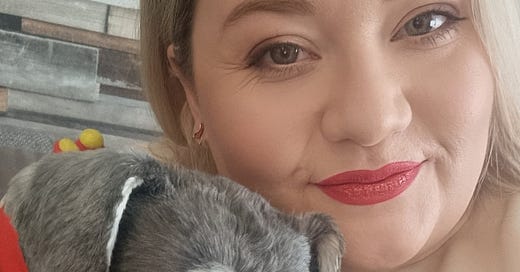Campaigner Kerri Fleming, Hamilton
When Kerri's beloved dog Nuke began frothing at the mouth and having seizures, she started investigating what had happened
Please note: The video below was filmed by Kerri to help her vet make a diagnosis but could be distressing to some viewers.

 Tiktok failed to load.
Tiktok failed to load.Enable 3rd party cookies or use another browser
Kerri didn’t set out to campaign against the use of pesticides in her local area, she was simply out walking her two year old dog Nuke before he became ill. But now she is convinced that his sudden illness resulted from contact with a sprayed substance on the grass.
“We were just outside and he was sniffing at the grass. I had taken him for a walk at a communal area.”
When they were back at home, she first noticed that Nuke was frothing at the mouth and then he started having seizures. The emergency vet asked her to film the seizures and believes the dog was poisoned. Since then the vet has taken regular blood tests with conclusive results still pending.
Now Kerri wants to warn other dog owners and is campaigning to have her local council, South Lanarkshire, stop spraying glyphosate in the area or at least set up a resident notification scheme.
“In Hamilton, it is commonplace for these herbicides to be sprayed on communal land, yet there is no system in place to notify the public prior to their application. This lack of transparency means that residents cannot take measures to protect their families, pets, and local wildlife from exposure. A simple notification system, whether through online alerts or physical signs, could prevent unnecessary harm and anxiety.”
Kerri’s launched a petition at Change.org which you can sign here.
At her local council, Kevin Carr, Head of Facilities, Waste and Grounds Services, told us: “South Lanarkshire Council, in common with many others across the UK, uses the legally approved herbicide Glyphosate to treat weeds on council-owned land and open spaces. Teams are trained to the required professional standards, work with minimum dosage rates, and keep detailed records of all application.
“However, in the last few years, following a council commitment to reduce and control the use of Plant Protection Products, we have reduced our total volume of chemical use by more than 30%. This has been achieved through the trialling of alternative treatment methods, as well as adding new equipment to our fleet which uses fewer chemicals overall.”
The Council also asked us to point out that, following Kerri’s complaint, they were able to check detailed chemical application logs which confirmed the most recent herbicide application in the area had been seven weeks prior.
This article is part of our In The Weeds Campaign with journalism supported by the Tenacious Awards.
How to support this campaign
Campaigners: Lets join forces! Please do let me know about your activity. Whether you’re an organisation working in this area or a concerned individual - I want to hear from you! I’ve set up this dedicated email, glyphosate@thenortherneco.com, and there’s also a whatApp group. Drop me a line if you’d like to be added to that group or have any other news to share. Let’s map your hard work for all to see.
Readers: Please do use the share button above to alert others to the campaign.
We’ll publish updates as we have them in this dedicated section as well as via social media so you’ll always be up-to-date on the latest development. As always, we’d love to hear from you with your thoughts on this campaign and any tip-offs of or sugesstions for stories too. You can drop us an email or contact via social media or commenting below.
Journalists: The stories generated for the campaign are freely available using a Creative Commons Share and Attribution Licence. If you’ve campaigners in your area - but no time for an interview or follow up - drop me a line to see if we can collaborate. It could be that I can provide copy to you for free. Finally, if you’re a freelancer with a unique story about glyphosate, please do pitch me as I’ve a small commissioning budget too.




